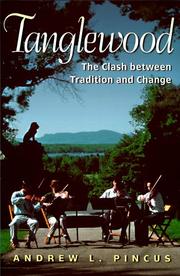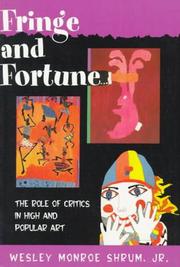| Listing 1 - 5 of 5 |
Sort by
|

ISBN: 1555533469 Year: 1998 Publisher: Boston Northeastern University Press
Abstract | Keywords | Export | Availability | Bookmark
 Loading...
Loading...Choose an application
- Reference Manager
- EndNote
- RefWorks (Direct export to RefWorks)
Book
Year: 1946 Publisher: Cambridge Harvard University Press
Abstract | Keywords | Export | Availability | Bookmark
 Loading...
Loading...Choose an application
- Reference Manager
- EndNote
- RefWorks (Direct export to RefWorks)
Book
ISBN: 1787444503 1787447138 1580469507 Year: 2019 Publisher: Rochester, NY: University of Rochester Press,
Abstract | Keywords | Export | Availability | Bookmark
 Loading...
Loading...Choose an application
- Reference Manager
- EndNote
- RefWorks (Direct export to RefWorks)
The demonization, internment, and deportation of celebrated Boston Symphony Orchestra conductor Dr. Karl Muck, finally told, and placed in the context of World War I anti-German sentiment in the United States.
Germans --- Conductors (Music) --- Xenophobia --- World War, 1914-1918 --- European War, 1914-1918 --- First World War, 1914-1918 --- Great War, 1914-1918 --- World War 1, 1914-1918 --- World War I, 1914-1918 --- World War One, 1914-1918 --- WW I (World War, 1914-1918) --- WWI (World War, 1914-1918) --- History, Modern --- Zenophobia --- Phobias --- Ethnology --- History --- Muck, Karl. --- Muk, Karl --- Muck, Carl --- America. --- Anti-German Sentiment. --- Boston Symphony Orchestra. --- Classical Music. --- Cultural History. --- Karl Muck Scandal. --- Karl Muck. --- Melissa D. Burrage. --- Music History. --- Musician. --- Political Climate. --- War Era. --- World War I. --- Xenophobia.
Book
ISBN: 1280116498 9786613520784 0520951867 9780520951860 0520267443 9780520267442 9781280116490 6613520780 Year: 2012 Publisher: Berkeley University of California Press
Abstract | Keywords | Export | Availability | Bookmark
 Loading...
Loading...Choose an application
- Reference Manager
- EndNote
- RefWorks (Direct export to RefWorks)
Joseph Horowitz writes in Moral Fire: "If the Met's screaming Wagnerites standing on chairs (in the 1890's) are unthinkable today, it is partly because we mistrust high feeling. Our children avidly specialize in vicarious forms of electronic interpersonal diversion. Our laptops and televisions ensnare us in a surrogate world that shuns all but facile passions; only Jon Stewart and Bill Maher share moments of moral outrage disguised as comedy." Arguing that the past can prove instructive and inspirational, Horowitz revisits four astonishing personalities-Henry Higginson, Laura Langford, Henry Krehbiel and Charles Ives-whose missionary work in the realm of culture signaled a belief in the fundamental decency of civilized human nature, in the universality of moral values, and in progress toward a kingdom of peace and love.
Music --- Music patronage --- Musical criticism --- Hermeneutics (Music) --- Music criticism --- Journalism --- Business patronage of music --- Corporations --- Maecenatism --- Patronage of music --- Performing arts sponsorship --- History and criticism. --- History --- History and criticism --- Higginson, Henry Lee, --- Krehbiel, Henry Edward, --- Holloway, Laura C. --- Ives, Charles, --- Ives, Charles Edward, --- Aĭvz, Ch., --- Aĭvz, Charlʹz, --- Holloway-Langford, Laura, --- Langford, Laura Carter Holloway, --- Krehbiel, H. E. --- Ives, Charles E. --- Ives, Charles --- Ives, Charles Edward --- 19th century music. --- 20th century music. --- american culture. --- american history. --- american music history. --- american musical life. --- american studies. --- boston symphony orchestra. --- charles ives. --- classic music. --- classical music. --- classical orchestra. --- cultural historians. --- gilded age. --- henry higginson. --- henry krehbiel. --- history of music. --- human nature. --- laura langford. --- moral values. --- music history and criticism. --- music lovers. --- music studies. --- musicians and historians. --- musicology. --- turn of the century america. --- us culture. --- us history.

ISBN: 0691026572 0691227632 Year: 1996 Publisher: Princeton (N.J.) : Princeton university press,
Abstract | Keywords | Export | Availability | Bookmark
 Loading...
Loading...Choose an application
- Reference Manager
- EndNote
- RefWorks (Direct export to RefWorks)
Why does the distinction between high and popular art persist in spite of postmodernist predictions that it should vanish? Departing from the conventional view that such distinctions are class-related, Wesley Shrum concentrates instead on the way individuals form opinions about culture through the mediation of critics. He shows that it is the extent to which critics shape the reception of an art form that determines its place in the cultural hierarchy. Those who patronize "lowbrow" art--stand-up comedy, cabaret, movies, and popular music--do not heed critical opinions nearly as much as do those who patronize "highbrow" art--theater, opera, and classical music. Thus the role of critics is crucial to understanding the nature of cultural hierarchy and its persistence. Shrum supports his argument through an inquiry into the performing arts, focusing on the Edinburgh Fringe, the world's largest and most diverse art festival. Beginning with eighteenth-century London playhouses and print media, where performance art criticism flourished, Shrum examines the triangle of mediation involving critics, spectators, and performers. The Fringe is shown to parallel modern art worlds, where choices proliferate along with the demand for guidance. Using interviews with critics and performers, analysis of audiences, and published reviews as well as dramatic vignettes, Shrum reveals the impact of critics on high art forms and explores the "status bargain" in which consumers are influenced by experts in return for prestige.
Art and society --- Art criticism --- Art et société --- Art--Critique --- Class distinction --- Classes [Social ] --- Classes sociales --- Critique d'art --- Culture [Popular ] --- Culture de rue --- Culture des banlieues populaires --- Culture des classes populaires --- Culture des quartiers populaires --- Culture du peuple --- Culture ouvrière --- Culture populaire --- Cultures populaires --- Distinction entre les classes --- Klassen [Sociale ] --- Klassenonderscheid --- Kunst en maatschappij --- Kunst--Kritiek --- Kunstkritiek --- Maatschappij en kunst --- Mass culture --- Pop culture --- Popcultuur --- Populaire cultuur --- Popular arts --- Popular culture --- Rank --- Social classes --- Sociale klassen --- Society and art --- Société et art --- Volkscultuur --- Art and society. --- Art criticism. --- Popular culture. --- Social classes. --- Edinburgh Fringe (Festival) --- Boston Symphony. --- British Broadcasting Corporation (BBC). --- Canadian fringes. --- Daily Telegraph. --- Festival Times. --- Festival of Israel. --- Fringe First awards. --- Fringe. --- Gilded Balloon. --- Holyrood Palace. --- Kant, Immanuel. --- Marquis of Tweeddale. --- Pleasance. --- Scottish nationalism. --- accessibility of art. --- accumulative advantage. --- aestheticians. --- amateur critics. --- amateur performers. --- attendance. --- cabaret. --- centralization. --- classical canon. --- competition. --- cultural capital. --- discourse practices. --- discovery myth. --- discriminating aesthetic. --- diversity. --- editorial bias. --- education. --- egalitarianism. --- entertainment. --- genres. --- heckling. --- hegemony theory. --- iconography of judgment. --- ideology. --- intimacy and space. --- judgment. --- medical revues. --- modality of reviews. --- modern criticism. --- opening date. --- painting. --- performance changes. --- quality claims. --- recommendations. --- reputation. --- revue. --- spectators. --- standards. --- Culture, Popular --- Communication --- Intellectual life --- Mass society --- Recreation --- Culture --- Art --- Art and sociology --- Sociology and art --- Arts --- Criticism --- Classes, Social --- Caste --- Estates (Social orders) --- Social status --- Class consciousness --- Classism --- Social stratification --- Social aspects --- Analysis, interpretation, appreciation --- Edinburgh Festival Fringe --- Fringe (Festival : Edinburgh, Scotland) --- Edinburgh International Festival
| Listing 1 - 5 of 5 |
Sort by
|

 Search
Search Feedback
Feedback About UniCat
About UniCat  Help
Help News
News